Sex in the City Harare
Thursday, July 17th, 2008 by Susan PietrzykA couple weeks back Kubatana advertised a call for people to participate in a documentary film about sex being made by the International Video Fair (IVF). This week the cameras are rolling. Seven women and seven men checked into the Bronte Hotel on Sunday and will be there through the week. The whole week is devoted to discussing sex. As well as all the various interconnected emotions and concerns. And the whole week is being filmed. It’s a project that fits perfectly into the goals of the IVF, and many organizations for that matter. To assist the general population by providing information and promoting dialogue. In the case of IVF, through the medium of film.
I’m involved in the production of this film. On Sunday just before things got started, among the team there was a collective: What have we done? Did we really invite 14 somewhat randomly selected Zimbabweans to spend five days discussing sex? Is this going to work?
We are now half way through the week and one word is filling my mind: Taboo. But not taboo in the way you might think I mean it. For years and years I’ve heard and read that to talk about sex in African countries is taboo. People just don’t do it. Donors tend to approach the subject with caution because it’s supposedly taboo. Instead they dance around the subject. Policy makers gingerly use the lens of gender because sex is taboo. And so on. Everyone seems to say taboo. But it’s not true. My ears are getting sore because these 14 people have volumes to say. The reason the word taboo is filling my mind is because it seems what’s taboo is not discussing sex, rather what’s become taboo is to create spaces for people to come together and speak about sex. We’re told we can’t talk about sex, so nobody takes the time to make the spaces available. This film project is correcting the way the taboo around sex has been repositioned. These 14 people have embraced this space and they’re making the most of it. The part of my mind that’s not filled with the word taboo is filled with the 842 insightful, thoughtful, engaging, intelligent, open, honest, raw, and most of all, valuable comments that have been made so far.










